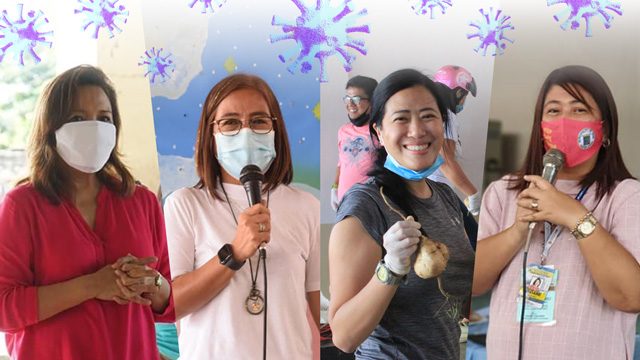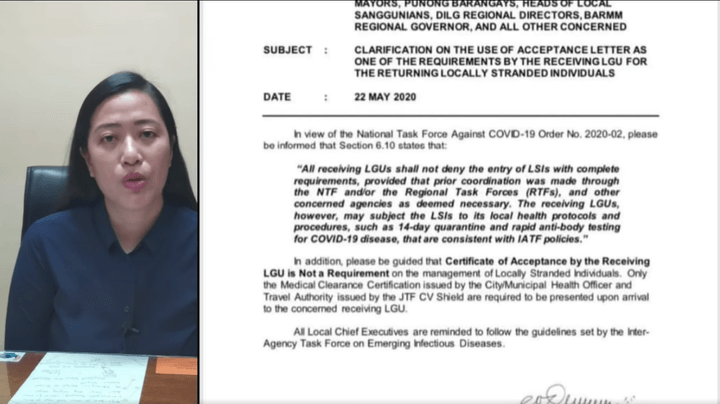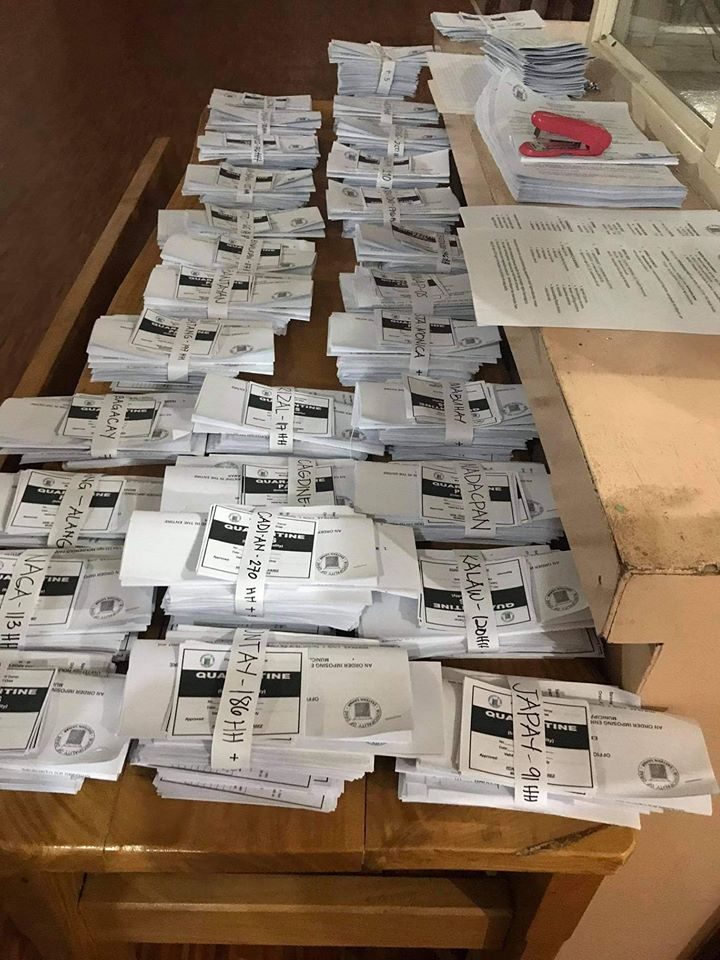SUMMARY
This is AI generated summarization, which may have errors. For context, always refer to the full article.

READ: PART 1 | In the fight vs COVID-19, these women mayors didn’t take chances
MANILA, Philippines – When the coronavirus pandemic reached the Philippines in late January 2020, the national government’s messaging was, “Everything is well.”
Even as other countries swiftly put in place sweeping restrictions to slow the spread of the virus, President Rodrigo Duterte assured people back in February that there was “nothing really to be extra scared of” and that the virus would ultimately die a “natural death” even without vaccines.
This was a far cry from reality, as confirmed coronavirus cases continued piling up. Since then, the count nationwide has reached almost 53,000 as of Friday, July 10.
In the face of an unseen enemy, several women mayors refused to sugarcoat the situation and chose to be upfront with their constituents about their fight against the coronavirus: “We may not know a lot about the virus, but there are things that we could do based on the information we already have.”
This was the messaging of Mayor Krisel Lagman-Luistro from Tabaco, Albay, who believed that an “informed citizenry is our best asset and defense to fight the virus.”
This is echoed by several other women mayors – including Mayor Trina Firmalo-Fabic of Odiongan, Romblon; Viviane Alvarez of Oras, Eastern Samar; and Macel Cumpio-Avestruz of Barugo, Leyte – all of whom put a premium on communicating with their constituents during the pandemic.
Part of Angat Bayi, a group that recognizes the fundamental value of women’s political participation in governance, these local chief executives pushed for ways to assure and comfort their people even when the health system of the Philippines was unprepared to deal with such a crisis. (READ: ‘Mayor of the Philippines’ leaves LGUs blind amid COVID-19)
“If we cannot give proper information to our people and we do not start with good data and good information, then we are just like fooling ourselves. That’s one thing that we should bring down to the family level, not just in the barangay level,” said Mayor Alvarez in a mix of Filipino and English.
People have started to listen
But how do you make people understand a complex virus, a vaccine for which remains elusive to scientists?
Early in the pandemic, the Duterte administration placed greater focus on keeping calm over emphasizing measures that had been put in place and should be observed. It didn’t help that the administration had downplayed the virus’ potential to become a full-blown threat at first. (READ: Pandemic unravels Duterte’s 2016 promise of decisive leadership)
“In early March, we were’t taking this seriously. Even the DOH was not aggressively campaigning against COVID,” Luistro said in Filipino.
Yet, as a nurse, Luistro knew locals must first understand the threat of an infectious virus so they can better protect themselves and others.
“Since the public’s participation is very important, the information has to be packaged in such a way that they can easily understand. I think it helps that I’m a woman because we make more of an effort to explain. It’s like you’re a teacher, ‘This is what we’ll do.’ I’m also a mother of 3 children, so it’s important that they understand as well,” she said.
In stark contrast to Malacañang top man’s sporadic and often late-night speeches, Tabaco City made sure to keep the community up-to-date through everyday reporting of COVID-19 updates on the radio from 7 to 9 am.
It also set up the Tabaco City COVID-19 Command Center on Facebook, which features easily digestible updates, infographics, and charts of local updates.
Even Mayor Luistro has her own Facebook page, which she manages herself, so she can easily share updates and be more accessible to the people.
The shift online has also made it easier for other local chief executives in the province to work together for their COVID-19 response after Luistro gathered them in one group chat. The Tabaco mayor said this has made it easier for local officials to implement policies from the national government since they can quickly discuss among themselves.
“I’m not a communication expert, but I can see the value of actually communicating. It can mobilize people to support a plan, avoid confusion. When it comes to accountabilities, it’s nice to know who’s accountable so nobody can wash the blame,” she said.
Taking off from the local government’s “City of Love” moniker, Tabaco also painted heart-shaped markings on the floors of the town’s market area to enforce physical distancing.
Luistro has witnessed herself how important communication can be, especially during a pandemic. For her, the results are clear: people have started to listen.
Getting the word out
In Odiongan, Romblon, Mayor Fabic focused on intensifying access to information by going on Facebook live, local television, and radio, especially during the first two weeks since President Rodrigo Duterte declared a state of public health emergency over coronavirus in March.

Pamphlets were distributed and given with relief goods to share more information about COVID-19, its level of transmission, and what guidelines were in place to protect locals.
Being open and addressing rumors in a timely manner, Fabic said, greatly aided in quelling panic. The quick updates made Odiongan residents relatively calm, with the mayor saying she hadn’t seen any false information about the town being shared because of this.
“As a woman, usually they say that we are more nurturing. I really try to step up and reassure my constituents during this time since during a pandemic I think a lot of people were very scared. They didn’t know what was happening,” said Mayor Fabic.
Mayor Fabic shared how “in the absence of a confirmed case, it can be a challenge to impress upon people the seriousness of the situation and convince them that they have to abide by the community quarantine guidelines.”
In Barugo, Leyte, Mayor Avestruz faced the same challenge and pushed for ways to ensure people understood the gravity of the coronavirus.
Aside from distributing pamphlets, loud speakers with a looped recording about COVID-19 were used in the barangays.
She also reached out to church leaders for help in information dissemination and made rounds in the town’s 37 barangays.
At a crucial time in Barugo’s fight against the coronavirus, however, Mayor Avestruz had to go under home quarantine in the latter half of March after attending the general assembly of the League of the Municipalities of the Philippines, where one of the participants tested positive.
Avestruz didn’t hesitate to disclose her situation, knowing communication and transparency were especially crucial in gaining the trust of the people.
“I wanted to lead by example. We were telling people that new arrivals had to be quarantined and yet I wasn’t following it? In fact, when I openly issued a statement through FB, at least I gained trust from them too,” she said.
Reaching out to peripheries
While many turned to social media to relay updates, several women mayors made sure that information about the outbreak reached areas that had no access to signal.
In Oras, Eastern Samar, Mayor Alvarez strongly advocated for the prevention of COVID-19 through the continuous dissemination of information, education, and communication materials written in the local language.
They translated brochures to Waray-waray, with illustrations to make locals know about COVID-19. Flyers, copies of executive orders, and other pertinent information about the pandemic were handed disseminated in the barangays.

Online, they focused on their Facebook accounts to regularly give updates and introduce interventions that were being done. For Mayor Alvarez, transparency and communication were especially important in gaining the public’s trust, especially when their town faced both the COVID-19 outbreak and the wrath of Typhoon Ambo at the same time. (READ: Reeling from Typhoon Ambo, Eastern Samar town appeals for help)
“How can you protect yourself if you do not know the facts? For me, we should always and at all times give the proper information to our people because that’s the only way we can get their cooperation,” said Alvarez.
Barugo had a similar arrangement. Prior to the pandemic, their barangays were already equipped with handheld radios connected to the town’s incident command system.
To reach out to those without signal, Avestruz relayed updates in the morning and evening through the handheld radios carried by the barangay captains, who would connect them to their own public address system for quick information dissemination.
The mayor said the handheld radio has been a big help since questions from checkpoints could easily be relayed and addressed with the help of the incident command system.
“It makes the remote barangays near the municipality through communicating by means of handheld radio. It’s a big help. If we use cellphones, there are areas where the signal is weak or inaccessible,” explained Mayor Avestruz in a mix of English and Filipino.
The town has even encouraged health workers to do their consultations via cellphone or handheld radio to avoid exposure.
“Women shine in this situation. That’s the edge of having that aspect of being a mother who takes care of her children. That’s an edge over others…. There’s that forecast of a woman where you’re already thinking ahead. You think 3 steps ahead because you want to be organized. Those traits contributed to where we are now,” said Avestruz.
Turning to data
Communication and data played a big role in not only making the people understand the gravity of the situation but also helped in making difficult choices for the local government.
Given their limited resources, the local government of Tabaco had to pinpoint which families were most in need of urgent relief. For the answer, they turned to data.
Instead of waiting for data from the National Statistics Office, the local government of Tabaco has been gathering basic data about households in the area every two years since 2008 for their community-based monitoring system.
It was thanks to this that Tabaco City was able to prioritize households that have low income and are in need of support.

Dr Nathalie Africa-Verceles, director of the University of the Philippines Center for Women’s and Gender Studies, said this only shows how women are just as capable of leading people through a “generalized health, social and economic crisis.”
Verceles attributes this mainly to how women have been raised to be caring, sensitive, compassionate, and open – traits that have so far helped in sensing the different needs of the people under a pandemic.
“Being a lady leader, we are more compassionate. We see problems in a holistic manner. It’s a big advantage on the part of the lady leaders because we see the needs of our people up to the minute things that are sometimes overlooked by our male counterparts,” said Mayor Alvarez.
“These are weapons we can use to navigate the crisis in such a way that we are able to meet the needs of everyone because we are more sensitive,” added Verceles, “It’s really being able to address the differentiated needs of the various marginalized sectors.” – Rappler.com
OTHER STORIES IN THE ‘PEOPLE VS PANDEMIC’ SERIES:
- In the fight vs COVID-19, these women mayors didn’t take chances
- Valenzuela City’s pandemic response: ‘Everything has to happen now’
- Legazpi City prepares a table for the quarantined
- In Baguio, Magalong returns as top investigator – for coronavirus contact tracing
- How Iloilo City became ‘Wakanda’ of the Philippines
- ‘Common sense’ and speed shield Marikina City from the coronavirus
- In Pasig, fighting corruption yields cash aid for the people
BOOKMARK THIS TO HAVE THE LINKS TO THE STORIES IN ONE PAGE:
Add a comment
How does this make you feel?





There are no comments yet. Add your comment to start the conversation.